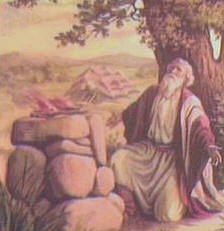Around 2200 BC, Abraham lived and founded the jewish people
(Genesis)
![]()
![]()
![]()
![]()
![]()
But theologists, historians and archaeologists have found that on closer inspection, the story of Abraham doesn't hold. Most serious bible researchers have concluded that we shouldn't take it literally. It's a beautiful story - but a story it is.
For starters, the Abraham epic is full of errors. The bible repeatedly tells us that Abraham possessed camels (Gen 12:16, Gen 14:10). Yet Abraham lived 1,300 years before camels were domesticated.
In Genesis 37:25, Abraham's son Joseph is sold to a caravan of camels 'loaded with spices, balm and myrrh' on its way to Egypt. But trade in these goods only blossomed 1,200 - 1,300 years later.
And there are many more mistakes like this. In Genesis 14:14, Abraham chases four kings to the city of Dan – a city which according to the bible itself was founded only a thousand years later (Judges 18:19). Abraham is said to have lived among the Chaldeans (Gen 11:31) and the Philistines (Gen 21:34). But both peoples weren’t around yet.
And how about Abraham's son Isaac visiting the city of Gerar? (Gen 26:1) You guessed it: Gerar didn't exist yet.
![]()
![]()
![]()
According to the bible, Abraham lived about 2,200 BC: the time when Stonehenge was built and the piramids were still brand new.
 |
|||
Exit Man of Faith |
|||
|
|
|||
Most serious researchers realise that Abraham never existed for real |
|||
We know nothing about individual people who lived back then. Abraham would make an incredible exception!
Genesis gives us even the tiniest details about Abraham's life and times. It quotes him. It tells us all about his dad Terach, his brothers Haran and Nachor, his wife Sarah, his mistress Hagar and his sons Ishmael and Isaac!
Of course, it is more likely the story of Abraham was invented much, much later. As the Dutch journalist and writer Marcel Hulspas put it:
More likely, Abraham’s story reflects other, older myths - we'll give you some examples elsewhere on this site.
At best, Abraham's story may contain some loose elements out of the lives of other legendary people that really did exist. In that respect, Abraham would be much like King Arthur or Santa Claus: 1 percent truth, but 99 percent myth.
![]()
![]()
![]()
But why then is it in the bible?
According to the leading Jewish bible archaeologists Israel Finkelstein and Neil Silberman, it has to do with politics.
Most likely, it was witten later on as a 'literary attempt to define the unity of the people of Israel.' It gave the Israelites a mighty and heroic history, a 'pious past'.
The Abraham epic assured everyone: you have a right to be here, because God has been friends with you for over a thousand years already.
![]()
![]()
Israel Finkelstein and Neil Asher Silberman: "The bible unearthed"
Marcel Hulspas: "En de zee spleet in tweeen"